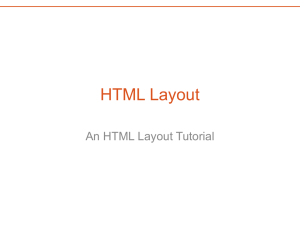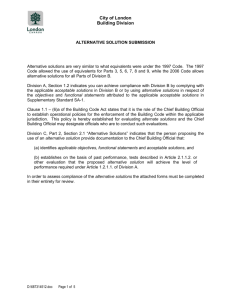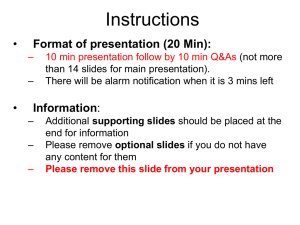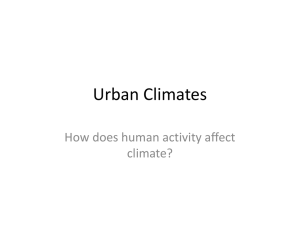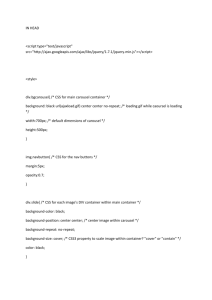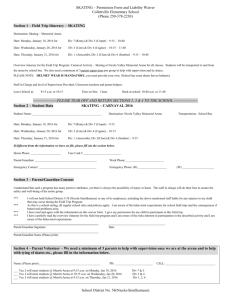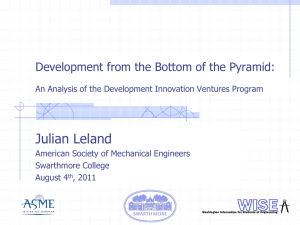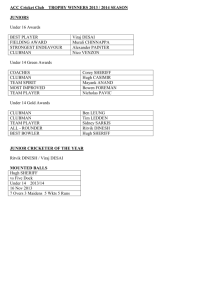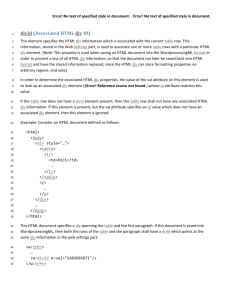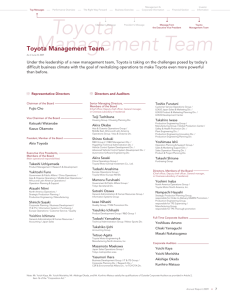BCBC_upload-(PresentationofKMWong)
advertisement
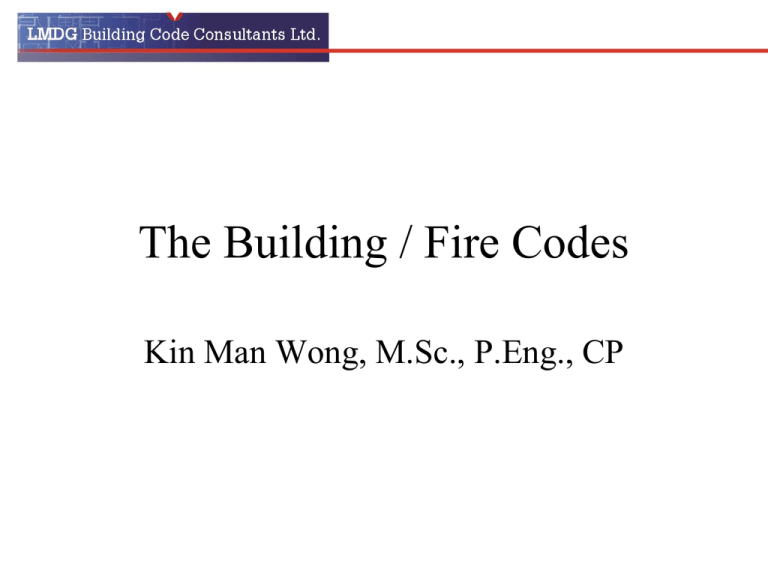
The Building / Fire Codes Kin Man Wong, M.Sc., P.Eng., CP BCBC 2006 / VBBL 2007 • Set out technical provisions for the design and construction of Buildings – – – – new alteration change of use demolition • Formulatedd based on NBC 2005 (2010) BCBC 2006 / VBBL 2007 • Address the following broad objectives – – – – – safety health accessibility fire protection environmental protection (VBBL) • Next BCBC revision in 2012 BCFC 2006 / VFBL 2000 • Applicable to facilities other than buildings • Include following provisions – maintenance and use of fire safety and fire protection features – conduct of activities – limitations on hazardous contents – fire safety plan – fire safety at construction and demolition sites Objective-Based Code Format Objective vs Performance • Benchmark approach – BCBC 2006 Div. A Clause 1.2.1.1.(1)(b), “…that will achieve at least the minimum level of performance required by Div. B ….” • Qualitative • First principle approach • Quantitative Structure of the Codes • Division A – Part 1: Compliance – Part 2: Objective Statements • • • • Safety Health Accessibility Protection of buildings and facilities – Part 3: Functional Statements Structure of the Codes (cont’d) • Division B – Acceptable Solutions – Part 1: General – Part 2: (reserved) – Part 3: Fire Protection, Occupant Safety and Accessibility – Part 4: Structural Design – Part 5: Environmental Separation Structure of the Codes (cont’d) • Division B – Acceptable Solutions* – Part 6: HVAC – Part 7: Plumbing Services – Part 8: Safety Measures at Construction and Demolition Sites – Part 9: Housing and Small Buildings – Part 10 (VBBL): Existing Buildings • Division C – Administrative Provisions * Intent statements and Application statements Practitioners • Certified Professional • Building Code Consultant Certified Professional Program • Optional fast track projects through dedicated Registered Professional – Building Permit – Occupancy Permit • Only in participating municipalities – Vancouver, Surrey – Kelowna (?), Delta (?) Roles of CP • Retained by owner • Undertake plan reviews and field reviews on behalf of the AHJ with respect to “code co-ordination” • Issue CP letters of Assurance Areas of coordination by CP • Code coordination with Registered Professionals of record per Div. B parts 1 to 7 and relevant portions of part 9 • Code interpretation of Div. B parts 1, 2 and 3 • Through design stage, field review stage and occupancy stage Building Code Consultant • Specialist consultant to advise on Building Code conformance per Div. B (predominately parts 1, 2 and 3) • Develop Alternative Solutions based on Div. A Alternative Solution DIVISION B • quantitative performance criteria (minority) • basic acceptable solutions Mandatory Links DIVISION A • objectives • sub-objectives • functional requirements Alternative solution An Example Building with Interconnected Floor Space (i.e. atrium) Interconnected Floor Space • • • • • • • • noncombustible construction [3.2.8.3.(1)] vestibules for exit stairs [3.2.8.5.(1)] cumulative exit capacity [3.4.3.2.(6)] mechanical venting (4 a.c./hr) [3.2.8.8.(1)] draft stops [3.2.8.7.(1)] smoke detectors [3.2.4.11.(1)(f)] close spaced sprinklers [NFPA 13-1999 5-13.4] combustible content limits [3.2.8.9.(1)] Alternative Solutions Fire Safety Engineering Approach Develop Alternative Solution Division A Performance Criteria Mitigating proposals Fire modelling/ TEA no Meet Criteria? yes Alternative solution Design Option meets code compliance requirements via alternative solution Code Reference 2 Code Reference 1 Objective 1 Objective 2 Subobjective A Performance criteria Objective 3 Objective 4 Subobjective B Functional statement 01 Functional statement 02 Performance criteria-1 Performance criteria-2 AND gate Mitigating Measures • Sprinkler system – Enhanced reliability • Early warning system – Smoke detectors adjacent to interconnected floor spaces to activate alarm and smoke management system • Automatic smoke management system – Smoke exhaust and make up air supply • Power supply – Enhanced reliability Fire modelling /TEA • Fire Dynamic Simulator • Pathfinder Division B Acceptable Solution establishes the baseline level of performance RSET ASET Code conforming vestibules and cumulative exit stair widths incorporated Division A Alternative Solution to perform as well as or better than the Acceptable Solution RSET ASET END
